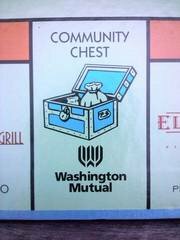Last night Seattle Arts & Lectures invited to town Jonathan Franzen, author of The Corrections and, more recently, Freedom--which is both "visceral and lapidary," says the New York Times' Michiko Kakutani, whom Franzen once called "the stupidest person in New York."
If you subscribe to TIME, you have a recent copy featuring Franzen staring off-screen as he's lauded as the Great American Novelist. (Locally, Michael Upchurch would seem to agree.)
On the other hand, two of the most commonly used words last night were "torture" and "torment," so life is not yet a bowl of cherries for Franzen. SAL wanted a substantive talk, not a book reading, so Franzen obliged by reading a lecture he'd prepared for a German audience, thinking that this level of continental sophistication would go over well here. Kafka figured prominently.
It was also a year old, and when he came to references that had aged in the interim, he broke out a pen and updated them on the fly. Correction is constant in the Franzen weltanschauung; here he is laboring to answer a question later on in the evening: "So the project...the project becomes...to look in...inward...."
His talk centered on the four big question that authors are asked--which remarkably stopped no one in the audience from writing down variations of these on their question cards. For the record, the standard foursome are, Who are your influences?, What time of day do you write?, Do your characters "take over" the telling of the story?, and Is your fiction autobiographical?...
 The Benaroya Companies are moving to the Eastside, reports the PSBJ. They're taking up residence in a 79,000-sq.-ft. Benaroya-owned building they've been working on refilling since Zango closed. The short story seems to be that it was easier to pick up stakes and move themselves than find someone to lease the last 8,300 sq. ft. Still, it's a portentous shift, given that Benaroya is the name of Seattle's symphony hall.
The Benaroya Companies are moving to the Eastside, reports the PSBJ. They're taking up residence in a 79,000-sq.-ft. Benaroya-owned building they've been working on refilling since Zango closed. The short story seems to be that it was easier to pick up stakes and move themselves than find someone to lease the last 8,300 sq. ft. Still, it's a portentous shift, given that Benaroya is the name of Seattle's symphony hall.
Meanwhile, mega-developers Schnitzer West have sold two major properties, notes Eric Pryne in the Seattle Times, Bellevue's Advanta Office Commons and Seattle's Equinox apartments née condos. (Equinox and Escala were among the last--if not the last--condo buildings to complete as the downturn shut off financing.) In both sales, Schnitzer West beat the properties' appraised value by wide margins--$75 million for Advanta, and almost $20 million for Equinox.
 And last week Target announced they were coming to Seattle's Pike Plaza, at the foot of the Newmark. Downtown residents rejoiced at the news, and if CHS polls are to be believed, Capitol Hill hipsters think it's just far enough away for them to retain credibility while slinking off-Hill for bargain-shopping.
And last week Target announced they were coming to Seattle's Pike Plaza, at the foot of the Newmark. Downtown residents rejoiced at the news, and if CHS polls are to be believed, Capitol Hill hipsters think it's just far enough away for them to retain credibility while slinking off-Hill for bargain-shopping.
Tomorrow night is your one chance this week to hear the Russian National Orchestra live. The concert begins at 7:30 p.m. at Benaroya Hall, and the program includes Tchaikovsky's Elegy for String Orchestra, Shostakovich's Symphony No. 9 in E-flat major, and Dvorak's Cello Concerto in B minor. (Tickets are $32-$106). With the RNO in Seattle is young cellist Sergey Antonov, the son of a Moscow Conservatory cello teacher and a cellist with the Bolshoi Symphony Orchestra. Rostropovich is a big fan.
Tom Keogh charts the orchestra's meteoric rise since its founding in 1990 as an orchestra independent of state control. You could be forgiven for thinking the RNO exists mainly to give classical music critics the chance to outdo each other with superlatives. When they recorded Tchaikovsky's Pathétique, Gramophone labeled it the best ever, asking, "Should human beings be able to play like this?"
Shostakovich's ninth symphony is notable for its brevity (it generally comes in at under 30 minutes) and for its joyful, light mood. In fact, it has made listeners think of both Mozart and Haydn. Written to celebrate the Russian victory over the Nazis, it contained none of the thunder and tragedy expected from Shostakovich, who knew from brass and drums, and was yet another reason the Party felt like Shostakovich just didn't get what they were trying to do.
So while the Tchaikovsky and Dvorak will sweep you away, no doubt, the Shostakovich should be something to behold as well, and not--this time--because when you hear the music and close your eyes, you think of Stalin.
Most Viewed Stories
- Flash! A Mob Takes Qwest Field at Half-Time
- Opinion: An Atheist's Defense of "Everybody Draw Mohammed Day"
- Why Will Smith, Joe Montana, and Wayne Gretzky Are All Coming to Issaquah Tonight
- Gather 'Round, Children, and Hear the Story of Courtney Love's Bumbershoot Secret Show
- Film Forum Spotlights Leonard Cohen, Small-Town Ohio
Top Rated Stories
- Stars, Ice, and Impossible Beauty: Backpacking in the North Cascades [Photo Gallery]
- PAX Prime 2010: Nerds In The Mist
- Allez au Cinema! Avec "The French Project"
- Wheedle's Groove's Soul Men, Interviewed at Bumbershoot 2010 [Photo Gallery]
- (Don't) Save it for Later: The English Beat's Dave Wakeling, Interviewed

Most Recent Comments